Round 6 of Pittsburgh Chess Club tournament: playing pragmatically
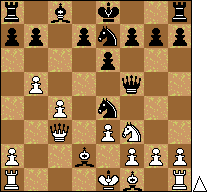
Last week in round 5, I reported on a disastrous game I played in which I was mentally unbalanced and lost, for the second time in the current Pittsburgh Chess Club tournament, a game in which I was winning and went into an endgame one Pawn up.
In this week’s game, I also ended up in an endgame one Pawn up.
But I played pragmatically this time. I’ll explain what that means and why it is important.
The complete annotated game
At your convenience, you can enjoy playing over the game with my annotations, including diagrams.
Preparation
Since I had lost two games in a row, I was paired against an opponent, Jeff, of considerably lower rating than me, at his floor of 1900.
Jeff had been much stronger in many years ago but after a visit to the hospital several years ago that resulted in his fighting for a year just to survive at all, he has never regained his former strength. I am very happy that he is back to stable health at all. He is a real asset to the Pittsburgh Chess Club, serving as a steward who opens and closes the club, answers the phone, etc: he was the very first person I met when I stopped by the club for the first time eight years ago, and he was so kind and helpful as I came back to chess after a two-decade absence that I decided to join the club and began playing in tournaments again in 2005. I owe Jeff for my return to chess play.
As for my record against Jeff, I had only played one game as White against him, in 2006, and lost when I failed to continue my attack properly against his Sicilian; I have won three games as Black against him in 2005, 2006, and 2008.
I had no time or energy to devote to any special preparation for our game. In fact, I was so exhausted after the past couple of days (that included performing music at the annual Pittsburgh Contras and Squares Holiday Ball that I spent the weekend feeling as though I was going to get sick, slept a massive amount on both Saturday and Sunday, and on Sunday decided that I would take Monday (yesterday) off from work in order to continue to recover my health.
So I did only two things to prepare for the final (whew) round of the chess tournament:
- Don’t do anything stupid (the way I did in the last two tournament games).
- As White, I had some control over the opening. I anticipated that he would play a Nimzo-Indian against me if I let him, and I saw no reason to prevent him from doing so. I am very happy to play White against the Nimzo-Indian.
Overview of my game
The opening
As I half-expected, Jeff played the Nimzo-Indian against me. We entered a variation that favors White.
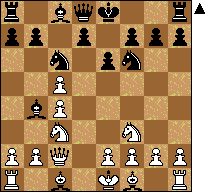
The middle game
We ended up in a strange position in which Jeff for some reason chose to sacrifice his g7 Pawn for some activity.

I took the Pawn, and then made a pragmatic decision to start simplifying to an endgame. This was not the strongest continuation, but I made this decision because frankly, I was very tired and my highest priority was to avoid a pointless loss caused by inability to calculate properly. So I wanted to simplify. In my last two games, I also deliberately chose to simplify, but then did not follow up consistently.
My plan this time was to be consistent: play into a Pawn-up endgame where I had no chance of losing and where I was the only one with any chance of winning. Then I would sit and wait until my opponent made errors. If he didn’t and therefore held the draw, then so be it. I was tired of just plain losing out of time pressure and fatigue. I decided to stay ahead on the clock in a superior endgame.
The endgame
So I forced an exchange of Queens and even traded off Bishops.
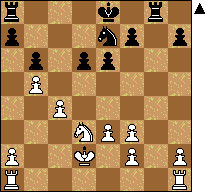
Objectively, this endgame should be a draw, of course.
But what is “objectivity” when I’m tired, and my opponent is over 200 rating points weaker than I am? In the end, chess is a human struggle of imperfection. My goal in this game was simply to avoid losing while preserving chances for a win, to close out this tournament with some honor.
In a single move, pushing d5, Jeff finally blundered into a lost game.
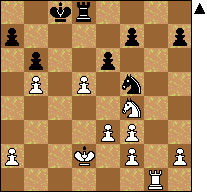
Again, after this blunder, which loses a second Pawn (because Black ends up with too many weak isolated Pawns), I continued to play pragmatically. I didn’t look for the fastest win, the most elegant. I looked for what I felt to be the safest win. I played to prevent Black from any chances at counterplay. I slowly pushed my central Pawn mass, rather than go for some faster win that would rely on fewer of my forces but require more calculation. The last two weeks of playing in a tired physical and mental state showed that I could not trust my calculations. On the other hand, if I played relatively mindless but obviously good moves, rather than looking for the “best” moves, I could guarantee a win eventually.
And so I did.
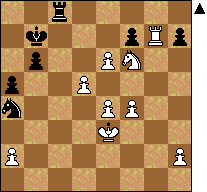
Lessons learned
There was nothing very exciting about this game. It was just a game in which I had an advantage straight out of the opening and was never worse and also never played the best moves at interesting points in the game. I only played “good enough” moves.
I only show this game to illustrate what it means to play pragmatically when outside forces dictate that this is the correct thing to do.
- I am human; if I am tired, I must play differently than when I am fully rested and mentally sharp.
- If the goal is to win, against a weaker opponent, it is often enough to just maintain an advantage, even in an objectively drawn endgame, because if he could always draw this kind of endgame, then he would have a higher rating.
What next?
I’m totally exhausted from the past two months of my life, and ready for the winter holidays, during which I expect to mostly just stay at home and recharge, and figure out my plans for the coming year.
I’m absolutely certain now that next year I should not play again in this annual Tuesday night tournament that spans November and December. This is a bad time of year for me in terms of all the things that pile up on me at the end of the year. The historical record: I played terribly in this tournament also in 2010 and in 2008. I should have thought about this trend before signing up this year.
I will decide by New Year whether to play in the next Tuesday night tournament. Part of me clearly wants to continue with my chess explorations, but I really have to take into account what other commitments I’ll be making for January and February, to make sure I don’t play chess tired.
Followup report on the tournament
The two guys I lost to in rounds 4 and 5 played each other to decide first place in the tournament. Ed ended up winning. I saw part of the game before I finished mine and left, and will comment on it in my next chess blog post.
Conclusion
I went into this final round of the chess tournament with a clear goal, and a clear method of achieving it, which was to play pragmatically and get the win. I accomplished this non-glamorous goal, and hope that in the future, I will be more deliberately pragmatic in my play in general.

I wonder how Chao Chao kept himself so sharp for so many battles, as if his health or mental acumen are almost always at tip-top form.